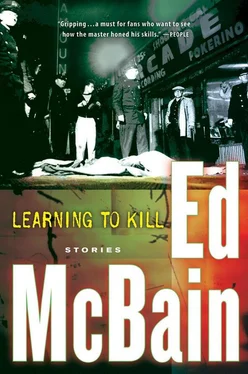“ I’m Evan Hunter,” I said.
Well, after he got over his surprise, he told me the book was a good one, whoever had written it, and then explained where he thought it could benefit from a few revisions. He said he thought he could publish it by December of that year if I could get the revisions to him fairly quickly. I told him I thought I could, and then I suggested — since the cat was now out of the bag — that we use the byline S. A. Lombino on it, which was the name I’d used in college on my weekly column for the school newspaper.
Charlie looked at me long and hard.
“ Well,” he said, “it’s your book, and you can put whatever name you like on it. But I have to tell you... Evan Hunter will sell a lot more tickets. ”
So that’s what it’s all about, I thought. Never mind Grandpa traipsing all the way from Ruvo del Monte to Naples to get on a ship and sail steerage to America, never mind him getting his “first papers” here and later his citizenship, never mind all those bonfires celebrating freedom on election night, never mind all that Land of the Free and Home of the Brave oratory; if I put S. A Lombino on a novel, everyone will think it was written in crayon by a ditch digger or a gangster.
The very next week, I went downtown with a lawyer and got a court order that legally changed my name. I’ve been Evan Hunter since May of 1952, longer than I ever was Salvatore Lombino, longer than most of my readers have ever been on this earth. A sure affirmation of the correctness of my decision is that the Internet has never allowed me to forget that once upon a time, long long ago, in a galaxy far far away, I was “that Italian guy” named Salvatore Lombino.
Which brings us to the story that follows.
By February of 1954, when “Runaway” was first published in Manhunt, the neighborhood I’d lived in until I was twelve had changed drastically enough so that I could use it as the setting for the tale of an Innocent Bystander who becomes a Man on the Run. But even before the story was published, I had already changed the hero’s name from Johnny Trachetti to Johnny Lane, radically changed the setting from Italian Harlem to what was then called Negro Harlem, expanded the story into a novel, and submitted it to Gold Medal Books, who published the longer version in July as Runaway Black, the new title I’d given the novel. I was enormously pleased when one reviewer thought the Harlem background rang so true because Richard Marsten was undoubtedly a black man!
But the tale does not end there.
Years later, when a new paperback edition of the book was being planned by a publisher who shall go unnamed, I received a proof of the cover, and was shocked to see that the word “Black” had been dropped from the title. The book was now simply called Runaway, even though the lead character was now black and the setting was now black Harlem. I thought I’d entered a time warp. So I asked them how come. They told me that Runaway Black was a “racist” title. Racist! I told them that I had proved my credentials forever with The Blackboard Jungle, wherein Gregory Miller, a black kid (later played brilliantly on the screen by Sidney Poitier)was the goddamn hero, and if they didn’t want to use my title on the book, they could have their money back and forget publishing it altogether. Guess what? They took back their money.
This, then, is my first run at “Runaway,” with its original title and its original setting (the neighborhood I grew up in) and its original Johnny Trachetti — an innocent bystander if ever I saw one.
* * *
Because the neighborhood had ingrained fear so deeply inside him, he ran the instant he heard the shots.
He did not stop to wonder where the shots had come from. Shots meant trouble, and trouble meant cops, and in this neighborhood you ran when the cops came.
He cut down First Avenue, past the coal yards, past the corner bar, and then turned left on 119th Street, heading for Pleasant Avenue and then down toward the river. He didn’t stop running until he reached a bench on the Drive, and then he sat and looked uptown to where the Triboro arched its silvery sleek back against the sky. There was a football game today at Randall’s Island. He had seen the college girls, nubby-looking in their tweeds, and the men with pipes and porkpie hats, walking across the bridge earlier that day. They were like invaders from another world. They did not belong in the neighborhood, and he resented them.
He had been sitting on the bench for ten minutes when Snow White and the two cops pulled up. The white top of the squad car reflected the brilliant October sun, and it struck the old panic within him, but there was no place to go except the river, so he sat still and bulled it through. He heard the car doors slam shut with the solidity of bank vault doors, heard the empty, hollow clatter of the cops’ shoes on the pavement, and then saw shadows, long and thin in the afternoon sun, fall across the bench.
“Watching the water?” one cop asked.
He looked up, trying to feign surprise.
“Yeah,” he said, his voice trembling a little. “I’ve been watching the water.”
“We got a dead man,” the second cop said drily.
He blinked up at the cop, condemning himself for feeling guilty when he was completely innocent.
“A dead man?” he said. “Yeah?”
“This is all news to you, huh?” the first cop said.
“Yeah. Yeah, it is.”
“He got it with a zip gun, this guy,” the cop went on. “You ever own a zip gun?”
“No,” he lied. He had owned a zip gun once, before the cops had begun giving the gangs a lot of trouble. He had ditched the gun then, together with a knife that was over the legal limit in blade size.
“You never owned one, huh?” the cop said drily.
“No, never,” he lied again.
“You know a guy called Angelo?” He knew instantly that it was Angelo Brancusi they were speaking of. He wet his lips. “Lots of guys named Angelo,” he said.
“Only one guy named Angelo Brancusi. You know him?”
“I know him,” he said. “Sure. Everybody knows him.”
“But you particularly, huh?”
“Why me, particularly?”
“Maybe because your name is Johnny Trachetti.”
“That’s my name,” he said. “What’s this all about?”
“Maybe because Angelo tried to rape your kid sister, say two or three weeks ago. Maybe, let’s say, you and Angelo had a big tangle outside the RKO on 125th, with Angelo pulling homemade brass knucks and trying to rip your face apart with them. Maybe that’s why you know him particularly, huh, boy?”
“Angelo tried to work over lots of guys. Everybody knows his brass knucks. He made ’em from a garbage can handle. Besides, he stayed away from me since that time near the RKO. Angelo don’t bother me or my sister anymore.”
“You’re right there, boy,” the first cop said.
“What do you mean?”
“Angelo ain’t bothering anybody anymore,” the cop said. “It was Angelo who got zip-gunned.”
He wet his lips again. Out on the river a tug sent a blast to the sky, high and strident. The blast hung on the silence of the October air, and he could almost taste the brackishness of the river.
“I didn’t shoot him,” he said.
“I know,” the first cop told him. “That’s why you ran like a rat when we came on the scene.”
“Look,” he said, appealing to their common sense now, “I didn’t shoot him. I didn’t like him, but there was lots of guys didn’t like him. Look, why should I shoot him? Hey, come on, you don’t really think...”
Читать дальше












